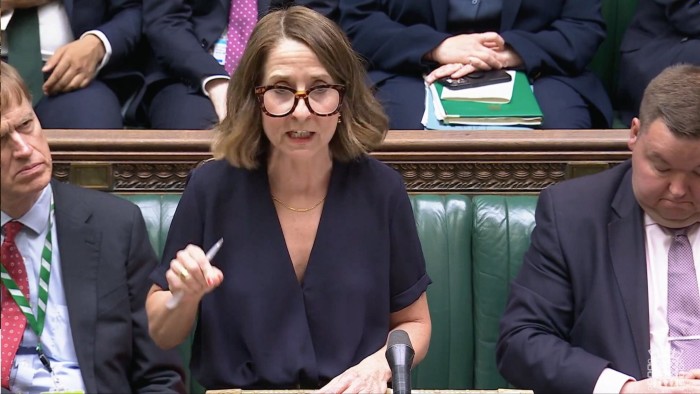Unlock the Editor’s Digest for free
Roula Khalaf, Editor of the FT, selects her favourite stories in this weekly newsletter.
Sir Keir Starmer gutted his controversial welfare bill on Tuesday as he attempt to fend off a full-scale Labour rebellion in chaotic House of Commons scenes, leaving a multibillion hole in UK public finances.
Amid fears of imminent defeat, Starmer authorised a last-minute climbdown. Experts said that net savings from the emasculated bill, which passed a parliamentary vote on Tuesday evening, initially intended to save £5bn, could even lose the government money overall.
The changes stripped out a clause that had been intended to generate the bulk of welfare savings by tightening eligibility criteria for the personal independence payment (Pip), the main disability benefit.
Labour MPs were astonished by the move, which leaves chancellor Rachel Reeves facing the prospect of raising taxes to cover the £5bn she had expected to save from the welfare bill.
Kemi Badenoch, Conservative leader, said on X: “This is an utter capitulation. Labour’s welfare bill is now a TOTAL waste of time. It effectively saves £0, helps no one into work, and does NOT control spending.”
Even after Starmer in effect dismantled the bill, there was still a significant Labour rebellion on its crucial second reading, which was carried by 335 to 260, a government majority of 75. A total of 49 Labour MPs voted against the bill, along with 100 Tories, 70 Liberal Democrats and 12 independents.
Sir Stephen Timms, disabilities minister, said any changes to the Pip criteria would now await the conclusion of the Pip review he is leading, in collaboration with disability groups, kicking the issue into the long grass.
Government insiders admitted they no longer knew how much the bill, which now mainly covers universal credit, would save. “It has all moved so quickly,” said one.
Many Labour MPs agreed with Badenoch that the bill had been rendered largely pointless. “It’s completely neutered,” said one.
Work and pensions secretary Liz Kendall agreed the last-minute climbdown after a day of negotiations with Labour rebels, talks that also involved Starmer and Reeves.
“What you’re netting out at is basically no savings — it will be just around zero,” said Louise Murphy, a senior economist at the Resolution Foundation, about the decision to scrap all tracts of the bill relating to disability benefit reform.
Murphy said that after all of the Pip reforms had been removed, the package would likely cost the Treasury around £300mn in 2029-30.
A person close to the discussions said the final change — to scrap all elements of the Pip reform — would not have happened if ministers were confident they would win the vote on Tuesday.
“There was an acknowledgment across government that we moved too quickly and we need to learn lessons from that,” they said.
One Labour MP described scenes on Tuesday evening as a “shitshow on stilts”.
“That is one of the most disgraceful pieces of parliamentary business I’ve seen in my time here,” they said. “They cannot be happy with how this has gone and someone’s inevitably going to take the fall for this.”
Another said that chancellor Rachel Reeves “must be toast after this — she can’t avoid the blame game and she is ultimately responsible”.
Late on Tuesday, around an hour before a key vote, the government announced that it would be removing Clause 5 of the welfare bill — the entire section relating to changes to the Pip eligibility criteria.
There had been signs of growing unease earlier in the day as members debated the bill.
The reforms had been intended to tighten Pip criteria but a concession by Stamer last week meant that the changes would not affect existing beneficiaries. Now they have been removed entirely from the bill.
Allies of Starmer admitted that major reforms to disability benefits were now on hold, pending the conclusion of Timms’ review, although Labour officials insisted the massively watered down bill would not be killed off.
One said: “We accept the will of the House and will look at it again post-review. The destination — a system that supports the most vulnerable and doesn’t trap people — remains. It’s been less than smooth, but change isn’t easy.”







